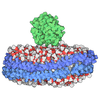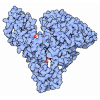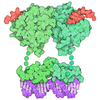[English] 日本語
 Yorodumi
Yorodumi- PDB-1le2: STRUCTURAL BASIS FOR ALTERED FUNCTION IN THE COMMON MUTANTS OF HU... -
+ Open data
Open data
- Basic information
Basic information
| Entry | Database: PDB / ID: 1le2 | ||||||
|---|---|---|---|---|---|---|---|
| Title | STRUCTURAL BASIS FOR ALTERED FUNCTION IN THE COMMON MUTANTS OF HUMAN APOLIPOPROTEIN-E | ||||||
 Components Components | APOLIPOPROTEIN E2 | ||||||
 Keywords Keywords | LIPOPROTEIN | ||||||
| Function / homology |  Function and homology information Function and homology informationlipid transport involved in lipid storage / intermediate-density lipoprotein particle clearance / positive regulation of lipid transport across blood-brain barrier / regulation of cellular response to very-low-density lipoprotein particle stimulus / metal chelating activity / triglyceride-rich lipoprotein particle clearance / discoidal high-density lipoprotein particle / lipoprotein particle / negative regulation of triglyceride metabolic process / maintenance of location in cell ...lipid transport involved in lipid storage / intermediate-density lipoprotein particle clearance / positive regulation of lipid transport across blood-brain barrier / regulation of cellular response to very-low-density lipoprotein particle stimulus / metal chelating activity / triglyceride-rich lipoprotein particle clearance / discoidal high-density lipoprotein particle / lipoprotein particle / negative regulation of triglyceride metabolic process / maintenance of location in cell / regulation of amyloid-beta clearance / negative regulation of cholesterol biosynthetic process / positive regulation of lipoprotein transport / Transcriptional regulation by the AP-2 (TFAP2) family of transcription factors / chylomicron remnant clearance / chylomicron remnant / intermediate-density lipoprotein particle / acylglycerol homeostasis / NMDA glutamate receptor clustering / very-low-density lipoprotein particle remodeling / Chylomicron clearance / phosphatidylcholine-sterol O-acyltransferase activator activity / positive regulation of phospholipid efflux / Chylomicron remodeling / positive regulation of low-density lipoprotein particle receptor catabolic process / response to caloric restriction / cellular response to lipoprotein particle stimulus / very-low-density lipoprotein particle clearance / lipid transporter activity / Chylomicron assembly / high-density lipoprotein particle clearance / phospholipid efflux / chylomicron / regulation of protein metabolic process / very-low-density lipoprotein particle receptor binding / regulation of amyloid fibril formation / lipoprotein catabolic process / AMPA glutamate receptor clustering / high-density lipoprotein particle remodeling / melanosome organization / positive regulation of cholesterol metabolic process / multivesicular body, internal vesicle / regulation of behavioral fear response / reverse cholesterol transport / positive regulation of amyloid-beta clearance / high-density lipoprotein particle assembly / host-mediated activation of viral process / low-density lipoprotein particle / lipoprotein biosynthetic process / cholesterol transfer activity / protein import / high-density lipoprotein particle / very-low-density lipoprotein particle / cholesterol catabolic process / heparan sulfate proteoglycan binding / low-density lipoprotein particle remodeling / amyloid precursor protein metabolic process / negative regulation of amyloid fibril formation / regulation of Cdc42 protein signal transduction / positive regulation of membrane protein ectodomain proteolysis / synaptic transmission, cholinergic / regulation of amyloid precursor protein catabolic process / HDL remodeling / negative regulation of endothelial cell migration / cholesterol efflux / regulation of cholesterol metabolic process / artery morphogenesis / regulation of axon extension / negative regulation of protein metabolic process / Scavenging by Class A Receptors / triglyceride homeostasis / triglyceride metabolic process / low-density lipoprotein particle receptor binding / positive regulation of amyloid fibril formation / regulation of innate immune response / virion assembly / negative regulation of endothelial cell proliferation / positive regulation of dendritic spine development / response to dietary excess / antioxidant activity / negative regulation of MAP kinase activity / negative regulation of amyloid-beta formation / lipoprotein particle binding / locomotory exploration behavior / negative regulation of long-term synaptic potentiation / negative regulation of blood vessel endothelial cell migration / positive regulation of endocytosis / negative regulation of platelet activation / negative regulation of blood coagulation / positive regulation of dendritic spine maintenance / regulation of neuronal synaptic plasticity / positive regulation of cholesterol efflux / negative regulation of protein secretion / fatty acid homeostasis / long-term memory / regulation of protein-containing complex assembly / synaptic cleft / long-chain fatty acid transport / intracellular transport / positive regulation of lipid biosynthetic process Similarity search - Function | ||||||
| Biological species |  Homo sapiens (human) Homo sapiens (human) | ||||||
| Method |  X-RAY DIFFRACTION / Resolution: 3 Å X-RAY DIFFRACTION / Resolution: 3 Å | ||||||
 Authors Authors | Wilson, C. / Agard, D.A. | ||||||
 Citation Citation |  Journal: Structure / Year: 1994 Journal: Structure / Year: 1994Title: Salt bridge relay triggers defective LDL receptor binding by a mutant apolipoprotein. Authors: Wilson, C. / Mau, T. / Weisgraber, K.H. / Wardell, M.R. / Mahley, R.W. / Agard, D.A. #1:  Journal: Science / Year: 1991 Journal: Science / Year: 1991Title: Three-Dimensional Structure of the Ldl Receptor-Binding Domain of Human Apolipoprotein E Authors: Wilson, C. / Wardell, M.R. / Weisgraber, K.H. / Mahley, R.W. / Agard, D.A. #2:  Journal: J.Mol.Biol. / Year: 1988 Journal: J.Mol.Biol. / Year: 1988Title: Crystallization and Preliminary X-Ray Diffraction Studies on the Amino-Terminal (Receptor-Binding) Domain of Human Apolipoprotein E3 from Serum Very Low Density Lipoproteins Authors: Aggerbeck, L.P. / Wetterau, J.R. / Weisgraber, K.H. / Mahley, R.W. / Agard, D.A. | ||||||
| History |
|
- Structure visualization
Structure visualization
| Structure viewer | Molecule:  Molmil Molmil Jmol/JSmol Jmol/JSmol |
|---|
- Downloads & links
Downloads & links
- Download
Download
| PDBx/mmCIF format |  1le2.cif.gz 1le2.cif.gz | 39.7 KB | Display |  PDBx/mmCIF format PDBx/mmCIF format |
|---|---|---|---|---|
| PDB format |  pdb1le2.ent.gz pdb1le2.ent.gz | 28.7 KB | Display |  PDB format PDB format |
| PDBx/mmJSON format |  1le2.json.gz 1le2.json.gz | Tree view |  PDBx/mmJSON format PDBx/mmJSON format | |
| Others |  Other downloads Other downloads |
-Validation report
| Summary document |  1le2_validation.pdf.gz 1le2_validation.pdf.gz | 366 KB | Display |  wwPDB validaton report wwPDB validaton report |
|---|---|---|---|---|
| Full document |  1le2_full_validation.pdf.gz 1le2_full_validation.pdf.gz | 375.6 KB | Display | |
| Data in XML |  1le2_validation.xml.gz 1le2_validation.xml.gz | 5.5 KB | Display | |
| Data in CIF |  1le2_validation.cif.gz 1le2_validation.cif.gz | 7.3 KB | Display | |
| Arichive directory |  https://data.pdbj.org/pub/pdb/validation_reports/le/1le2 https://data.pdbj.org/pub/pdb/validation_reports/le/1le2 ftp://data.pdbj.org/pub/pdb/validation_reports/le/1le2 ftp://data.pdbj.org/pub/pdb/validation_reports/le/1le2 | HTTPS FTP |
-Related structure data
| Similar structure data |
|---|
- Links
Links
- Assembly
Assembly
| Deposited unit | 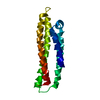
| ||||||||
|---|---|---|---|---|---|---|---|---|---|
| 1 |
| ||||||||
| Unit cell |
|
- Components
Components
| #1: Protein | Mass: 16689.027 Da / Num. of mol.: 1 Source method: isolated from a genetically manipulated source Source: (gene. exp.)  Homo sapiens (human) / Gene: E2 / Production host: unidentified (others) / References: UniProt: P02649 Homo sapiens (human) / Gene: E2 / Production host: unidentified (others) / References: UniProt: P02649 |
|---|---|
| Compound details | THREE ISOFORMS OF APO-E ARE RELATIVELY COMMON. THE APO-E2 ISOFORM DIFFERS FROM THE WILD-TYPE (E3) ...THREE ISOFORMS OF APO-E ARE RELATIVELY |
-Experimental details
-Experiment
| Experiment | Method:  X-RAY DIFFRACTION X-RAY DIFFRACTION |
|---|
- Sample preparation
Sample preparation
| Crystal | Density Matthews: 2.78 Å3/Da / Density % sol: 55.81 % | ||||||||||||||||||||||||||||||
|---|---|---|---|---|---|---|---|---|---|---|---|---|---|---|---|---|---|---|---|---|---|---|---|---|---|---|---|---|---|---|---|
| Crystal grow | *PLUS pH: 5.3 / Method: vapor diffusion, hanging drop | ||||||||||||||||||||||||||||||
| Components of the solutions | *PLUS
|
-Data collection
| Radiation | Scattering type: x-ray |
|---|---|
| Radiation wavelength | Relative weight: 1 |
| Reflection | *PLUS Highest resolution: 3 Å / Lowest resolution: 10 Å / Num. obs: 2749 / % possible obs: 67.9 % |
- Processing
Processing
| Software | Name:  X-PLOR / Classification: refinement X-PLOR / Classification: refinement | ||||||||||||||||||||||||||||||||||||||||||||||||||||||||||||
|---|---|---|---|---|---|---|---|---|---|---|---|---|---|---|---|---|---|---|---|---|---|---|---|---|---|---|---|---|---|---|---|---|---|---|---|---|---|---|---|---|---|---|---|---|---|---|---|---|---|---|---|---|---|---|---|---|---|---|---|---|---|
| Refinement | Rfactor Rwork: 0.195 / Highest resolution: 3 Å Details: THE LOOP CONNECTING THE SECOND AND THIRD HELICES OF THE FOUR-HELIX BUNDLE (RESIDUES 83-88) IS POORLY DEFINED IN THE ELECTRON DENSITY MAP. X-PLOR-REFINED COORDINATES FOR THE LOOP HAVE BEEN ...Details: THE LOOP CONNECTING THE SECOND AND THIRD HELICES OF THE FOUR-HELIX BUNDLE (RESIDUES 83-88) IS POORLY DEFINED IN THE ELECTRON DENSITY MAP. X-PLOR-REFINED COORDINATES FOR THE LOOP HAVE BEEN INCLUDED IN THE STRUCTURE BUT ARE LIKELY TO CONTAIN ERRORS. | ||||||||||||||||||||||||||||||||||||||||||||||||||||||||||||
| Refinement step | Cycle: LAST / Highest resolution: 3 Å
| ||||||||||||||||||||||||||||||||||||||||||||||||||||||||||||
| Refine LS restraints |
| ||||||||||||||||||||||||||||||||||||||||||||||||||||||||||||
| Software | *PLUS Name:  X-PLOR / Classification: refinement X-PLOR / Classification: refinement | ||||||||||||||||||||||||||||||||||||||||||||||||||||||||||||
| Refinement | *PLUS Lowest resolution: 8 Å / Num. reflection obs: 2749 / σ(I): 2 / Rfactor Rwork: 0.195 | ||||||||||||||||||||||||||||||||||||||||||||||||||||||||||||
| Solvent computation | *PLUS | ||||||||||||||||||||||||||||||||||||||||||||||||||||||||||||
| Displacement parameters | *PLUS | ||||||||||||||||||||||||||||||||||||||||||||||||||||||||||||
| Refine LS restraints | *PLUS Type: x_angle_d / Dev ideal: 3.7 |
 Movie
Movie Controller
Controller


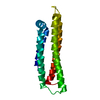
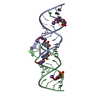
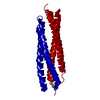
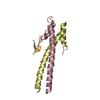
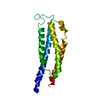
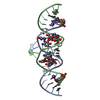

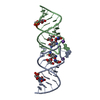

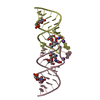
 PDBj
PDBj